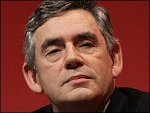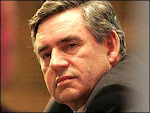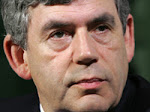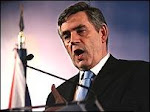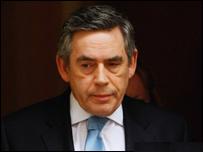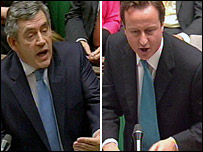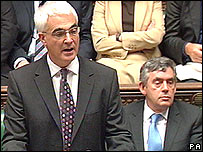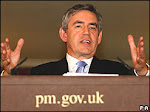Thursday 27 September 2007
Why do they still vote for us ?
Tuesday 25 September 2007
Independant? I have my doubts
The Chancellor's 1997 pension fund raid will have far greater consequences than previous calculations indicated, say specialists
It will reduce the value of the pension pot that typical employees could expect to save over their working lives by up to 13 per cent
By Andrew Murray-Watson
Published: 08 April 2007
Chancellor Gordon Brown's tax raid on pension funds is set to cost a typical worker in the UK over £100,000.
A joint investigation by The Independent on Sunday and BDO Stoy Hayward, the specialist accountancy and business advisory group, has revealed that Mr Brown's 1997 decision to tax dividends paid into pension funds will have far greater consequences than previously thought.
The £100,000 figure represents a reduction of up to 13 per cent in the value of the pension pot a typical employee who pays into a defined contribution scheme could expect to save over the course of their working life.
BDO Stoy Hayward used two examples in its investigation - a 25-year-old earning £20,000 in 1997 and a 35-year-old earning £50,000 in the same year. The accountants assumed that both would work uninterrupted until they retired aged 65, in 2037 and 2027 respectively.
September2007
See this link
http://news.independent.co.uk/business/news/article2432337.ece
MORE TELEGRAPH
By Liam Halligan, Economics Editor
Last Updated: 11:45pm BST 14/10/2006
The chances are that you have never heard of "advance corporation tax relief". And you probably didn't notice when Gordon Brown abolished it, without warning, in his first Budget back in July 1997.
You may, on the other hand, have heard of "Labour's £5bn pension stealth tax". That is because it has since become clear that the Chancellor's policy shift – removing tax relief on income from share dividends – was very harmful to British pension funds.
Gordon Brown and Tony Blair
Blair warned the Chancellor not to tax private pension funds so brutally, but Brown wanted to hit the ‘fat cats’
Announcing the move, Brown told the Commons that this was a "long-needed reform". But most actuaries now agree, if only sotto voce, that it has contributed mightily to the closure, since Labour took office, of thousands of final salary schemes.
The resulting loss of income and dignity – to say nothing of the stress – endured by members who have seen part or all of their "guaranteed" pensions disappear is among the biggest injustices of our time.
See This link
http://www.telegraph.co.uk/money/main.jhtml?xml=/money/2006/10/15/ccliam15.xml
MORE TIMES
John Hutton, the Work and Pensions Secretary, renewed his call for a contest for the Labour leadership as former ministers and senior MPs admitted that the furore had increased the chances of a serious challenger stepping forward. They said that it sowed serious doubts about Mr Brown’s judgment and economic competence.
After a two-year freedom of information battle with the Treasury, The Times obtained documents on Friday which showed that Mr Brown had pushed through tax changes in his first Budget in 1997 despite warnings from officials that it would cost occupational and private pension funds up to £75 billion and make millions of pensioners worse off.
Pensions campaigners claim it shows that he deliberately went about destroying what was at that time one of the best pension systems in the world. April 2007
See this Link
http://www.timesonline.co.uk/tol/news/politics/article1599964.ece
OH DEAR AND THE TELEGRAPH
By Philip Aldrick and Edmund Conway
Last Updated: 11:26pm BST 31/03/2007
Have your say Read comments
# Read the Treasury documents into the impact on pension funds
# 'Time-bomb' warnings the Chancellor ignored
# The Act that forced publication
Gordon Brown was warned explicitly that he would cause the death of the final salary pension scheme and cost companies and individuals billions of pounds when he took the knife to the pension system in his first Budget.
Chancellor Gordon Brown visiting troops in Afghanistan yesterday
Chancellor Brown visiting troops in Afghanistan yesterday
Confidential documents sent to the Chancellor before he axed the dividend tax credit in 1997 also warned that the worst-hit victims would be the poorest members of society.
The internal Treasury forecasts, released last night under the Freedom of Information Act, state that the changes would "cause a shortfall in existing assets of up to £75 billion" and that "employers would have to contribute about an extra £10 billion a year for the next 10 to 15 years to get pension scheme funding back o March 2007
See this Link
http://www.telegraph.co.uk/news/main.jhtml?xml=/news/2007/03/31/nbrown31.xml
THE TIMES AGAIN !!
Helen Nugent
Gordon Brown defied repeated warnings from his own officials about the potentially devastating impact of his £5 billion-a-year raid on pension funds and went ahead with it regardless, The Times can reveal.
Pensions campaigners described the revelations — the result of a two year battle by The Times — as an absolute disgrace, and said that it showed the Chancellor “knowingly set about destroying” Britain’s pensions system.
Mr Brown announced the scrapping of tax relief on dividends paid into pension funds in his first Budget in July 1997, in the single biggest change to the pensions system in a generation.
Experts claim that the move has deprived the country’s savers of at least £100 billion over the past decade, during which Britain’s private and occupational pension system has struggled to stay afloat. The changes affected the 11 million people in Britain with company pensions and the 7 million with personal pensions. March 2007
See Link for full story
http://business.timesonline.co.uk/tol/business/money/pensions/article1593939.ece
NOT MY BEEB AS WELL
Mr Brown was accused of mounting a "raid" on pension funds by removing tax credit on share dividends in 1997.
Now the freedom of information watchdog has told Mr Brown to release Treasury forecasts of the impact of the move.
The Treasury now has until early July to release the papers or appeal against the commissioner's ruling.
It is the second major freedom of information ruling which has gone against the government this month. June 2006
See this link
http://news.bbc.co.uk/1/hi/uk_politics/5099428.stm
GARBAGEGATE YES INDEED!
"Things soon got to the point where, if you could see Gordon's mouth open, you knew he was either lying or he was at his cosmetic dentist and a self-serving and totally bogus press release about his pain threshold was on the way."
"When the going gets tough for Labour, Gordon disappears."
"Gordon is clearly a student of the Enron School of Accounting and a member of the Robert Maxwell Institute of Pension Administration."
"As a politician, if you can fake sincerity, you've cracked it. Gordon showed, when Blair announced that he was stepping down and would quit in 2 months, that he still has a long, long way to go as his speech in praise of Blair was a masterclass in insincerity. Similarly, when he heard that he would not have to go through an election to become the next Labour leader, his protestations of humility, which drew laughter from the attendant journalists, were another model of insincerity."
"Gordon suffers from the belief that he's the bee's knees. Luckily, no one else shares his delusion."
see this link
http://myweb.tiscali.co.uk/garbagegate/item2/brlegacy.htm
Not the Times as well !
As the Chancellor maintained his silence on the issue, the Confederation of British Industry went on the offensive, saying it was “completely untrue” that it had ever supported the hugely controversial £5 bil-lion-a-year tax raid on pensions in Labour’s first Budget in 1997. The extraordinary row is a blow to the Chancellor’s long-fought-for reputation as a friend of business.
Ed Balls, the Treasury Minister and close ally of Mr Brown, had to issue a statement retracting claims that he made on Saturday that the CBI fully supported the move to cut tax relief on dividends paid to pensions. The Treasury then became embroiled in a second spin row after it changed its story on why it released highly damaging reports about the tax move late on Friday while Parliament was in recess.
Treasury officials denied trying to bury bad news and told journalists that they had to issue the papers before an Information Commission tribunal yesterday. When it was pointed out that there was never going to be a tribunal yesterday, they claimed that the papers were issued at the first opportunity.
See this link for the full article
http://business.timesonline.co.uk/tol/business/money/pensions/article1605116.ece
See what I said this one only says £5 Billion !!!!
Brown's tax raid on pensions
Simon Moon, This is MoneyUpdated 4 April
The furore triggered by revelations about Gordon Brown's 1997 decision to tax pension funds is threatening to blow up into a major crisis.
 | CRISIS: The Treasury fought for two years to prevent the publication of advice to the Chancellor |

 OTHER STORIES
OTHER STORIES

 FTSE LATEST
FTSE LATEST

 POWER PORTFOLIO
POWER PORTFOLIO
 This is Money's free Power Portfolio tool allows you to keep track of your shares and funds. >> Track your shares
This is Money's free Power Portfolio tool allows you to keep track of your shares and funds. >> Track your shares 
 LATEST SHARE TIPS
LATEST SHARE TIPS
See this link for the full article
http://www.thisismoney.co.uk/news/special-report/article.html?in_article_id=419027&in_page_id=108
£100 Billion !! My mother told me not to believe all I read in the papers , the internet must b=e the same
But the Chancellor pressed ahead regardless despite warnings of a 'big hole' in private pensions and serious risks to the stability of the system.
The decision by Brown and his then top adviser Ed Balls (now a Treasury minister) has been even more far-reaching than officials thought. There has been a wholesale retreat from 'final salary' pension schemes, the gold standard of retirement provision, leaving m
Just as damaging is the massive gulf that has opened up between public sector pensions and those in the wealth-creating part of the economy.
Best estimates by actuaries who monitor the retirement industry suggest that Brown's decision has cost company pensions more than £100billion. It is the cost of funding this shortfall which has led to the flight from final salary pensions.
See this link for the full article
LSE
Dr Altman also suggests that Mr Brown needs to accept responsibility for those who have experienced pensions losses through failed final salary schemes since 1997.
The investment expert, banker and economist, who is also an adviser to the pensions industry, states that the chancellor ignored warnings which suggested the actions he made after Labour came to government could undermine pension scheme finances.
Furthermore, she indicates that the prime minister-to-be never gave the members of smaller company pension schemes due consideration.
"Pension funds are not just pools of money, they have people's lives attached," said Dr Altman.
"Particularly in the UK, where the state pension is about the lowest of any developed country, a private pension is essential to avoid poverty in retirement."
See the full item at this link
http://www.savingforretirement.co.uk/Investment-expert-questions-Brown-s-pensions-policy-175_62_18107515.html
LSE
LSE
According to the NAPF, while the removal of tax credit in 1997 did contribute to the current problems within the pensions sector, subsequent actions have also increased the pressure on workplace pension schemes.
Nigel Peaple, the director of policy at the NAPF, argued that: "Some of these pressures were beyond anyone's control, such as increasing longevity and the fall in equity markets.
"But others were man-made, such as the introduction of new accounting rules (FRS17) and the decision by successive governments to increase pension regulation."
Mr Peaple argued that employers who enrol their workers into pension schemes with higher contribution rates should be given more-favourable tax treatment by the government and should be offered a simple and flexible way of gaining exemption from personal accounts.
These latest comments come soon after the NAPF warned that the National Pensions Saving Scheme could be putting many workers at risk of losing their higher pensions contributions as it is targeting too wide a section of UK employees.
According to the organIsation's figures, the existing scheme is appropriate for only around 7.5 million employees across the country, and Mr Peaple urged the Chancellor, Gordon Brown, to focus on the future of UK pensions.
See full article here
http://www.savingforretirement.co.uk/Pension-pressure-not-just-caused-by-tax-credit-removal--175_62_18108319.html
LSE
Spectator
|
See full article here
http://www.spectator.co.uk/archive/business/25842/monetary-genius-i-beg-to-differ.thtml
Spectator
Monday 24 September 2007
Wall Street Journal
U.K. Share Prices Soar, But Rise May Be Brief
LONDON -- U.K. shares soared to new highs Thursday following the release of a laxer-than-expected budget from Tony Blair's new Labor government, but analysts said the rise was partly provoked by a surge on Wall Street and may prove short-lived.
Over the longer term, analysts say the implications of the budget are still far from clear. Depending on how companies and investors react to a change in the taxation of dividends for pension funds and institutional investors -- a measure that was one of the key features of Wednesday's budget announcement by Chancellor of the Exchequer Gordon BrownSee Full article at this link
http://online.wsj.com/article/SB867963303818597000.html?mod=googlewsj
